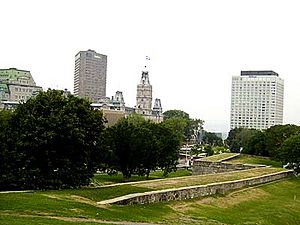Parliament Hill (Quebec City) facts for kids
Parliament Hill (French: Colline parlementaire) is a special area in Quebec City, Canada. It's located in the La Cité-Limoilou part of the city, specifically in the Vieux-Québec—Cap-Blanc—colline Parlementaire and Saint-Jean-Baptiste districts. This important hill is home to the Parliament Building of Quebec, where the province's government makes decisions. Besides government offices, you'll find streets with shops, homes, and lovely public green spaces here. The entire area sits on the promontory of Quebec, a high piece of land.
In 1985, the Parliament Building complex was recognized as a Site historique national, which means it's a National Historic Site of Canada. This shows how important it is to Canada's history.
Contents
Important Government Buildings
Parliament Hill is a busy place with many buildings where the government works. The most famous one is the Parliament Building itself, which is often called the Hôtel du Parlement. It's where the members of the National Assembly of Quebec meet to discuss laws and issues.
Some of the other important buildings on the Hill include:
- Complexe du Parlement (a group of buildings)
- Parliament Building (Hôtel du Parlement)
- Édifice Honoré-Mercier
- Édifice Marie-Guyart (a tall skyscraper)
- Centre des congrès du Québec (a convention center)
- Grand Théâtre de Québec et Conservatoire de musique (a theater and music school)
Homes and Shops on the Hill
Even though Parliament Hill is known for its government buildings, it's also a place where people live and shop! You can find residential areas and streets with stores. This mix makes it a lively part of Quebec City.
Some notable places include:
- Chapelle historique Bon-Pasteur (a historic chapel)
- Club Renaissance
- Tour Martello 2 (an old tower)
Famous Monuments and Art
Parliament Hill is decorated with many interesting monuments and sculptures. These artworks often tell stories about Quebec's history and important people.
Some of the monuments you can see are:
- Fontaine de Tourny (a beautiful fountain)
- The Inuksuk (a stone landmark made by Inuit people)
- Monument to Canadian Surveyors
- Monument to the Acadians (honoring the Acadian people)
- 1+1=1 (a unique sculpture)
- Totem of the centenary of the entry of British Columbia into Confederation (a totem pole)
Bronze Statues of Leaders
Around the gardens of Parliament Hill, you'll find many life-sized bronze statues. These statues honor important figures who helped shape Quebec and Canada. They are placed on pedestals, making them easy to spot.
Here are some of the people you'll see:
- Adelard Godbout (Premier from 1939 to 1944): He was a leader who helped women in Quebec get the right to vote. His statue was put up in 2000.
- Charles De Gaulle (President of France from 1959 to 1969): This statue honors his role in building strong connections between France and Quebec. It was finished in 1997.
- Daniel Johnson, Sr. (Premier from 1966 to 1968): He was a leader who welcomed General de Gaulle to Quebec. His statue was unveiled in 1999.
- François-Xavier Garneau (a famous writer): He was the first person to write a detailed history of Canada. His statue was revealed in 1912.
- Honoré Mercier (Premier from 1887 to 1891): He was a strong supporter of Quebec's independence. His statue was also created in 1912.
- Jean Lesage (Premier from 1961 to 1966): He is known as the "father of the Quiet Revolution," a time of big changes in Quebec. His statue was completed in 2000.
- Louis-Hippolyte La Fontaine (Premier from 1848 to 1851): He was a key leader in establishing "responsible government" in Canada, where the government is accountable to the people. His statue was unveiled in 2003.
- Louis-Joseph Papineau (leader of the parti patriote): He led a protest movement in 1837. His statue was launched in 2002.
- Maurice Duplessis (Premier from 1944 to 1959): He was a long-serving Premier during a period known as the Grande Noirceur. His statue was created in 1960 and unveiled in 1977.
- Louis-Joseph de Montcalm (French general): He led French troops during the Battle of the Plains of Abraham in 1760. His statue was created in 1911.
- René Lévesque (Premier from 1976 to 1985): He led the first government that wanted Quebec to become an independent country. His statue was unveiled in 2001.
- Monument Robert Bourassa (Premier from 1970 to 1976 and 1985 to 1994): He helped develop hydroelectric power in northern Quebec. His statue was launched in 2006.
- Short and Wallick (heroic soldiers): These two soldiers saved people from a fire in Saint-Sauveur in 1889. Their monument was put up in 1891.
Parks and Public Spaces
Parliament Hill has several beautiful parks and public spaces where people can relax and enjoy the outdoors. These areas often have special meanings.
- Parc de l'Amérique-Française: This park celebrates French-speaking communities in North America that were founded by people from Quebec and Acadia.
- Parc de la Francophonie: This park marks the 25th anniversary of an organization that promotes French culture and cooperation around the world.
- Place-National Assembly: This is a public square right in front of the Parliament Building.
- Place George-V
- Promenade des Acadiens: This walkway and its monument honor the Acadian people for their important contributions to Quebec.
- Promenade des Premiers-Ministres: Located along the Parliament complex, this walk honors the 26 Premiers of Quebec from when Canada was formed until 1996.
 | Jessica Watkins |
 | Robert Henry Lawrence Jr. |
 | Mae Jemison |
 | Sian Proctor |
 | Guion Bluford |


